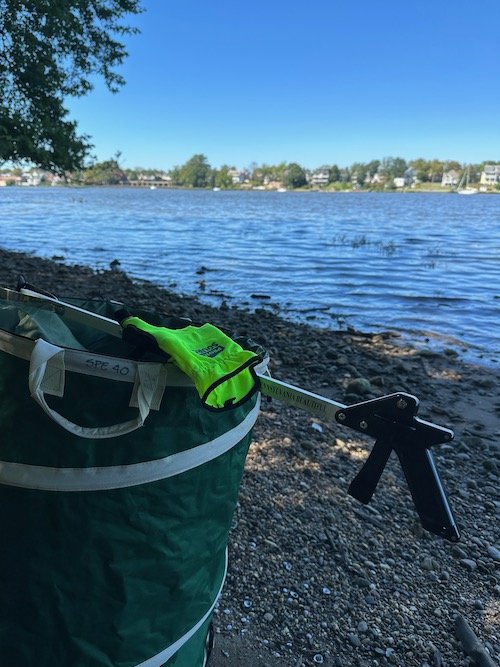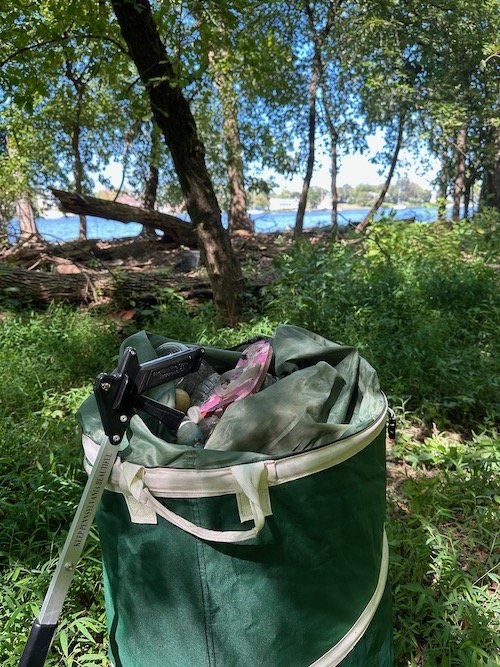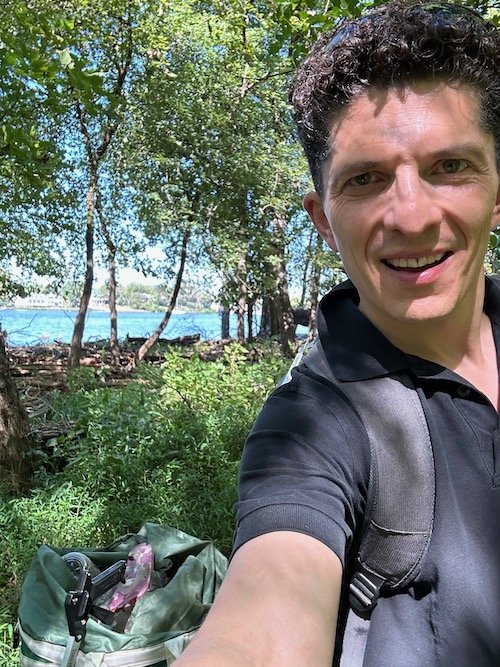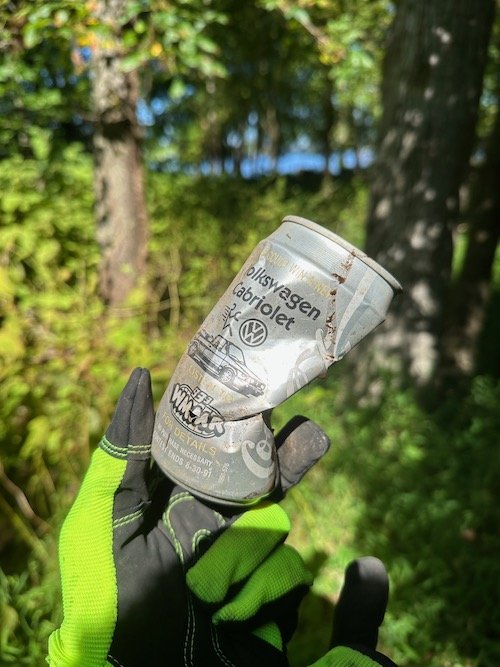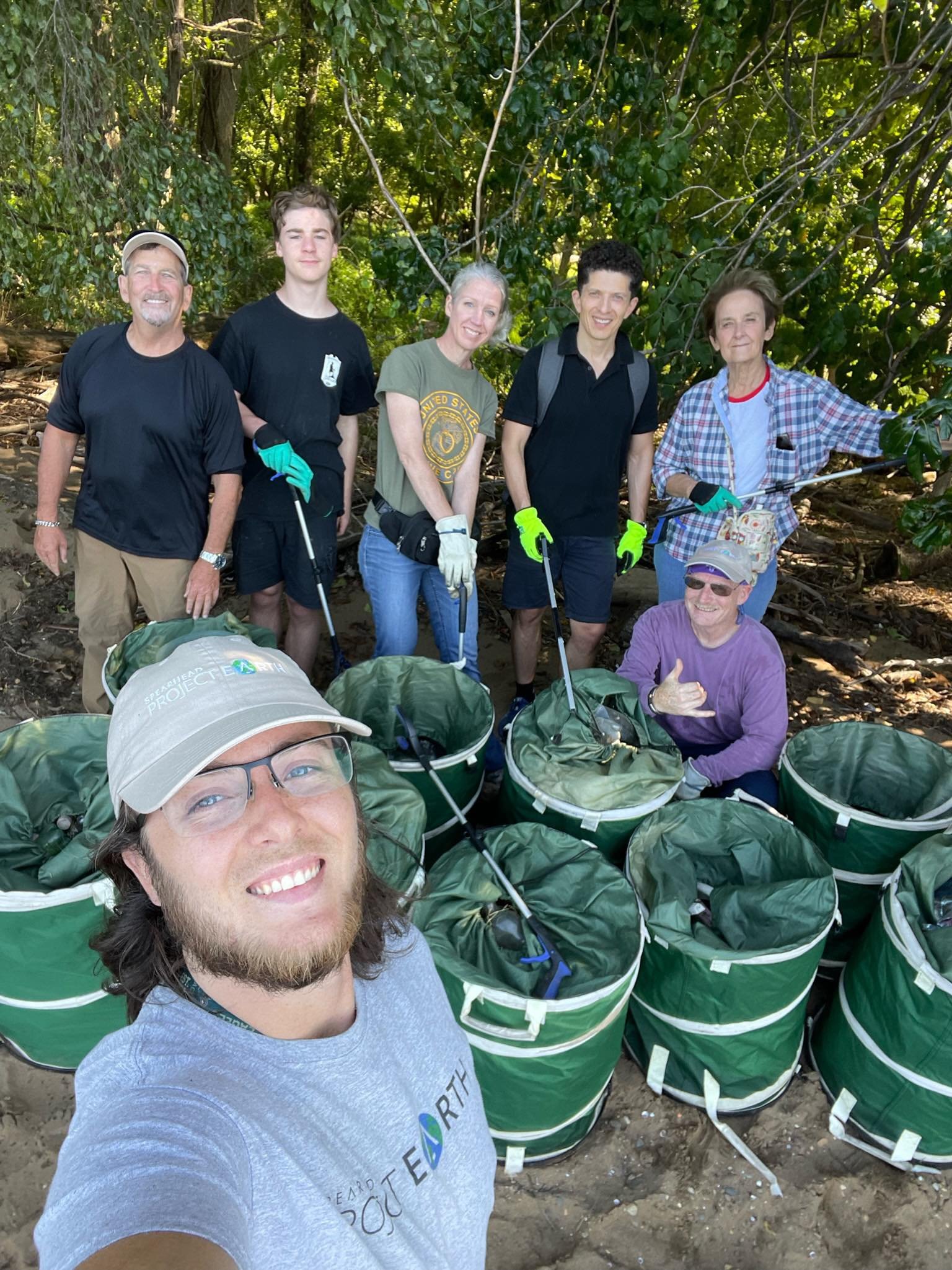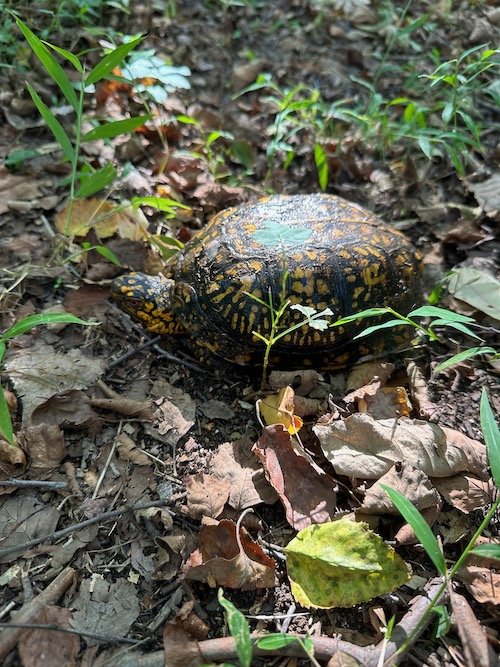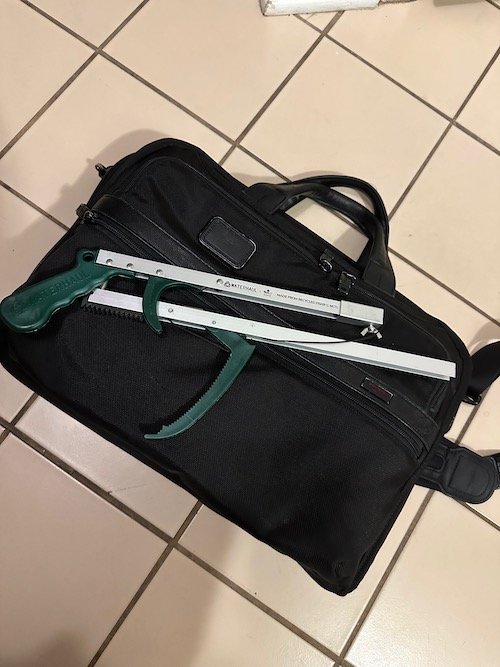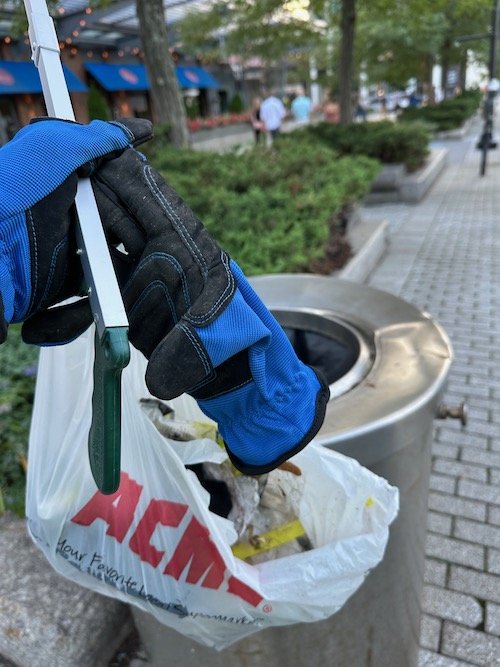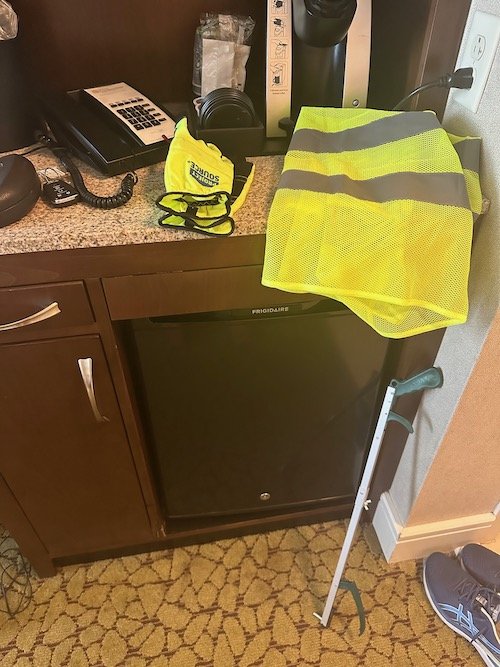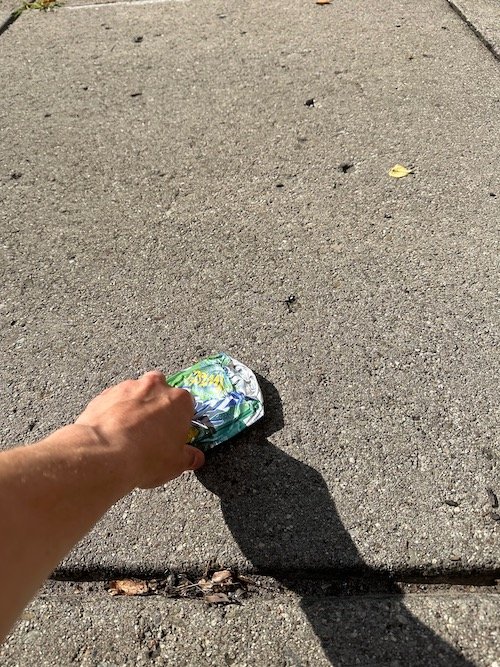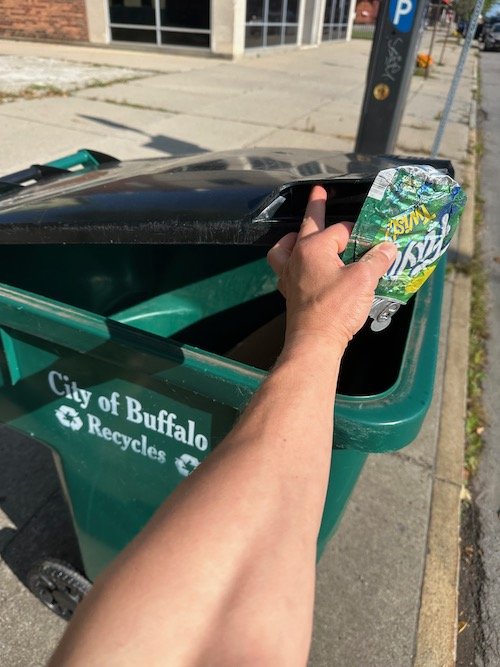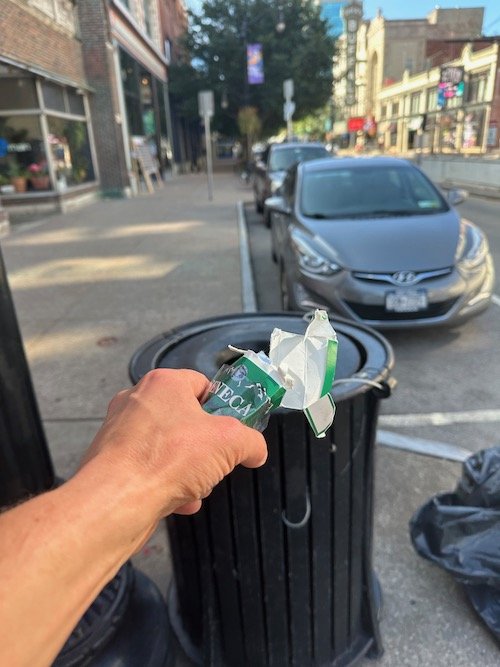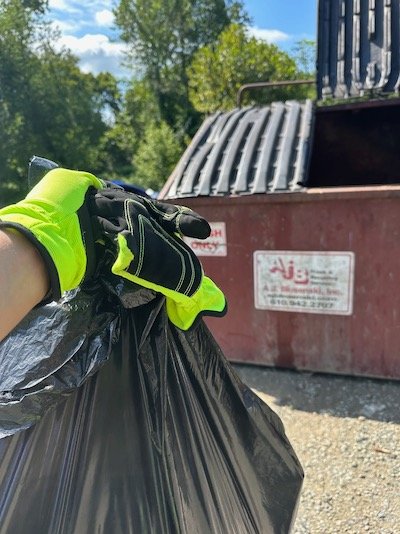The Power of Unity and Purpose: Organized Cleanups vs Solo Efforts
Introduction
In August 2023 I participated as a volunteer in my first group cleanup event, on the bank and surrounding trails of the Schuylkill river, in Phoenixville, PA. Organized by Save the Schuylkill and Litter Lifters of West Vincent, this landmark event attracted 115 people, and resulted in more than 20 cubic yards of trash and 80 tires being removed from the river and surrounding areas.
A few weeks afterward, and about 30 miles East, together with 5 other volunteers we cleaned up 233 lbs. of mostly recyclable items off Burlington Island, NJ, as part of a cleanup organized by Spearhead Project Earth.
After cleaning up litter on my own for some time now, these two group efforts were a novel, enjoyable experience and it’s helpful to compare and contrast cleaning up as part of a group effort to carrying it out individually:
Cleaning Up Litter: A Collective Endeavor
With an increasing focus on environmental conservation, many people are stepping up to take action against litter. Whether individually or as part of organized group events, both approaches have their merits and drawbacks. Yet when it comes to cleaning up trash from nature or places where it clearly does not belong, I found that there is strength in numbers.
Organized litter cleanup events, where volunteers gather to tackle trash together, have gained popularity for numerous reasons. These events offer an array of benefits that set them apart from solo cleanup efforts:
1. Building Connections and Community
One of the most significant advantages of participating in organized cleanup events is the opportunity to connect with like-minded people, weaving the social fabric in a way that David Brooks talks about in his work at the Aspen Institute. Cleaning up litter alongside others fosters a sense of community and shared purpose. It is a chance to meet people who care about the environment and to build friendships while working toward a common, worthy goal.
Furthermore, this external collaboration creates a snowball effect with the potential to reshape our relationship with litter and ignite broader societal change and progress.
2. Tackling Larger Items
Litter cleanup events often provide the manpower and resources needed to handle larger and more cumbersome items that an individual might struggle with, such as discarded tires, furniture, and other sizable debris. This collective effort ensures that no piece of litter is too large to be properly disposed of.
This also makes sense for the destination venue, whether a local recycling facility or waste management service. Receiving large quantities, and even presorted items in bulk is much more efficient and enables these service providers to reduce costs and hassle involved in the typical collection process from residential or commercial consumers.
3. Access to Resources and Sponsorships
Supplies provided by event organizers, before starting cleanup
Organized events enable volunteers and organizations to attract sponsorships and resources that might not be available to individuals. Sponsors can provide equipment like trucks, dumpsters, gloves, trash bags, litter grabbers, and high-visibility vests. These resources enhance the efficiency and safety of the cleanup effort.
In addition, organized events foster partnerships with local businesses, municipalities, and organizations, establishing a web of support. Sponsorships not only infuse the cleanup process with vital tools but also cultivate a shared sense of responsibility for the environment. As businesses invest in the cleanup, they cultivate a vested interest in maintaining a cleaner ecosystem, initiating a ripple effect that extends beyond the event.
In the case of our event in Phoenixville, organizers and volunteers benefitted from multiple key sponsorships from companies such as Wawa, Waste Connections/ AJ Blosenski, and Graphic Packaging.
4. Mutual Motivation
Participating in a group cleanup event can be surprisingly motivating. The camaraderie and even friendly competition among participants can push individuals to work harder and accomplish more. Seeing others committed to the cause can renew one's own dedication to environmental stewardship, and provide an often-needed sense of belonging.
5. Learning and Skill Sharing
Cleanup events frequently draw in individuals with diverse backgrounds and experiences. This environment becomes a fertile ground for learning new techniques and strategies for effective litter removal. More experienced volunteers can impart their wisdom and skills to newcomers, creating a valuable learning opportunity.
During the event in Phoenixville I had a chance to show off my knowledge of litter grabbers, teaching newcomers about what tools are available, and the pros and cons of each. At the same time I was humbled by the contributions of advanced volunteers, in areas such as organizing the event itself, picking up hard-to-reach litter by boat, or marshaling resources for disposing large trash items.
6. Reach Inaccessible or Restricted Areas
The Burlington Island cleanup is fairly unique in that it gives access to an area that is otherwise restricted. It is an uninhabited island sandwiched between Pennsylvania and New Jersey, and can only be accessed by boat. There are no bridges that connect land to land from either side of the river.
As a result, it takes considerable effort and and organized approach to set foot on this mostly pristine, and wild part of nature.
The cleanup effort required considerable logistics, with captain for the boat, necessary permits, pre-set destination for collected recyclables. The team did a great job, and once the cleanup effort was complete (see all the drums filled in the above pics), all the volunteers went on a 40 min. hike to the other side of the island.
It was a rare opportunity to experience the island’s natural beauty.
7. Impact and Visibility
An organized event can generate a greater impact and attract more attention from the local community and media. The collective effort sends a powerful message about the importance of environmental responsibility, inspiring others to join the cause and raising awareness about the litter issue.
Here is, as an example, my LinkedIn.com post after the event: four days after I posted it, it attracted a high number or “likes” and was viewed more than 1,800 times:
In addition, the Phoenixville event was picked up and reported by PA Environmental Digest, the comprehensive environmental newsletter published by David E. Hess, former Secretary of the Pennsylvania Department of Environmental Protection:
Flying Solo: The Individual Approach
I previously wrote about the benefits of cleaning up litter, focusing on the activity in general. From the solo vs group perspective, while group cleanup events offer several advantages as discussed above, there are situations where cleaning up litter individually can also be beneficial.
Here are the advantages of cleaning up litter on your own:
1. Flexibility
Cleaning up litter on your own allows for greater flexibility when it comes to timing and location. You can address litter in your immediate surroundings whenever it's convenient for you, without waiting for a scheduled event.
Or you can take your litter grabber with you, as I recently did on business trips to Boston, MA and Buffalo, NY: packing my yellow vest, gloves, and foldable litter grabber.
In Boston, after finishing work one evening I went for a 30 min. walk around my hotel, listened to a good podcast, and picked up a full bag of litter. In Buffalo I picked up litter outside my hotel in Lafayette Square one evening, and during a morning jog next day on Main Street.
Picking up litter when traveling is a neat way to give back and show appreciation for the environment at your target destination. It is the best kind of tourism, whether leisure or business, through contributing to the local habitat and truly leaving a place better than you found it.
2. Personal Reflection
Litter cleanup can be a solitary activity that provides time for personal reflection and connection with nature or the built environment. It allows individuals to experience the impact of litter firsthand and develop a deeper understanding of the environmental consequences.
Sometimes I compare cleaning up a public place by myself to working out (don’t feel like doing it, but know it’s good for me and that I will feel better afterwards), praying or meditating (again, may not feel like doing it, and feels awfully humbling, yet it provides an inner peace from carrying out an act of service), or simply acting out or being rebellious: it is an unconventional activity, as most people carry about their day around me.
3. Autonomy
Solo cleanup efforts provide complete autonomy over the entire cleanup process. The world is your oyster! Choose your own adventure: you can focus on areas that are particularly meaningful to you or address specific types of litter that concern you the most.
Instant job satisfaction
4. Immediate Action
When you encounter litter during your daily activities, you can take immediate action. This prevents the litter from causing further harm and demonstrates a personal commitment to maintaining a clean environment.
5. Educational Experience
Cleaning up litter as an individual can also be an educational experience. Researching proper disposal methods, testing different litter pick-up tools, or apps for logging cleanups, understanding the types of litter, and learning about the broader impact of litter on the environment can deepen your knowledge and awareness.
The Synergy of Unity and Independence
Rest assured: in the ongoing battle against litter and to restore the beauty of our environment, both collective and individual efforts play important roles. Organized cleanup events harness the power of community and resources to address larger-scale litter issues efficiently. They create an atmosphere of camaraderie and mutual motivation, turning the task into a social and educational experience, for the good of the community.
On the other hand, individual litter cleanup efforts offer autonomy, flexibility, and a more personal connection with the environment. These efforts serve as reminders of our individual responsibility to keep our surroundings clean and healthy.
Ultimately, the synergy of both approaches is the key to creating positive change and improving our environment. The key in my view stems from combining the collective force of organized events with the autonomy and dedication of individual actions. This forms a powerful alliance against litter, leading us toward building and maintaining a cleaner, healthier world.



